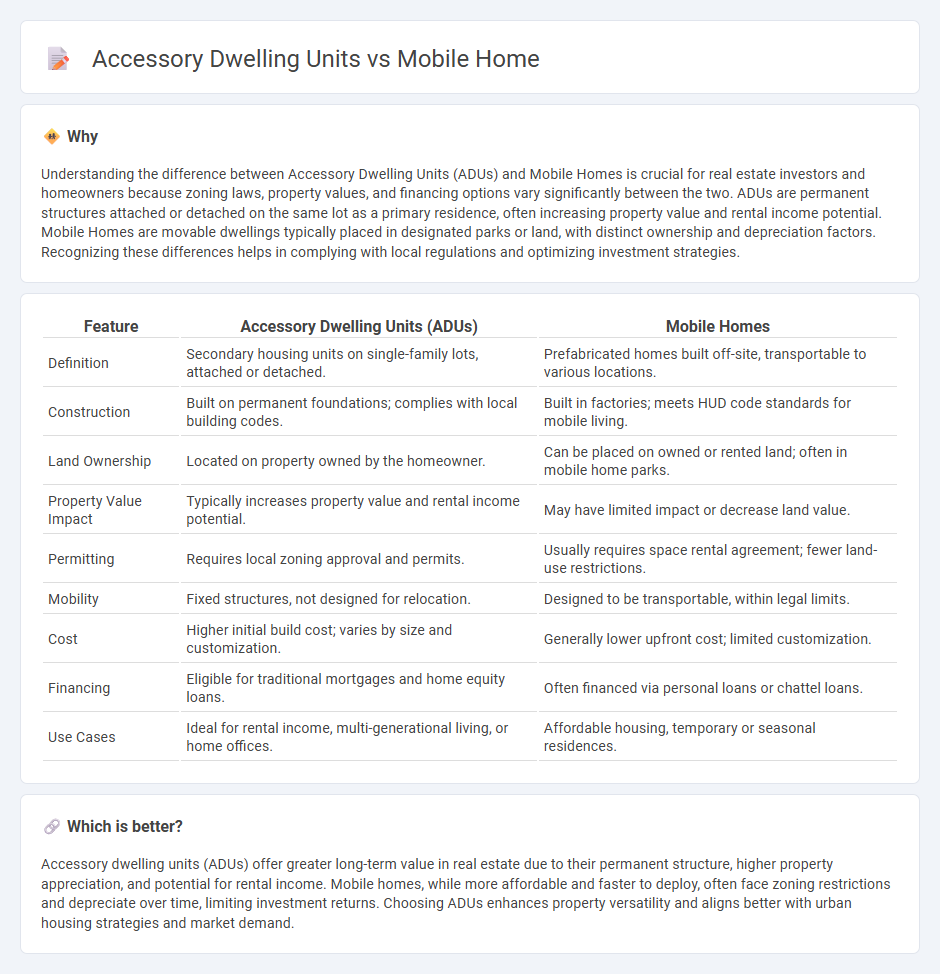
Accessory dwelling units (ADUs) are permanent, on-site housing units built within or adjacent to a primary residence, offering increased property value and urban density benefits. Mobile homes, also known as manufactured homes, are prefabricated structures designed for mobility and affordability, typically placed in designated communities or private land. Explore the key differences and benefits of ADUs and mobile homes to determine which housing solution fits your real estate goals.
Why it is important
Understanding the difference between Accessory Dwelling Units (ADUs) and Mobile Homes is crucial for real estate investors and homeowners because zoning laws, property values, and financing options vary significantly between the two. ADUs are permanent structures attached or detached on the same lot as a primary residence, often increasing property value and rental income potential. Mobile Homes are movable dwellings typically placed in designated parks or land, with distinct ownership and depreciation factors. Recognizing these differences helps in complying with local regulations and optimizing investment strategies.
Comparison Table
| Feature | Accessory Dwelling Units (ADUs) | Mobile Homes |
|---|---|---|
| Definition | Secondary housing units on single-family lots, attached or detached. | Prefabricated homes built off-site, transportable to various locations. |
| Construction | Built on permanent foundations; complies with local building codes. | Built in factories; meets HUD code standards for mobile living. |
| Land Ownership | Located on property owned by the homeowner. | Can be placed on owned or rented land; often in mobile home parks. |
| Property Value Impact | Typically increases property value and rental income potential. | May have limited impact or decrease land value. |
| Permitting | Requires local zoning approval and permits. | Usually requires space rental agreement; fewer land-use restrictions. |
| Mobility | Fixed structures, not designed for relocation. | Designed to be transportable, within legal limits. |
| Cost | Higher initial build cost; varies by size and customization. | Generally lower upfront cost; limited customization. |
| Financing | Eligible for traditional mortgages and home equity loans. | Often financed via personal loans or chattel loans. |
| Use Cases | Ideal for rental income, multi-generational living, or home offices. | Affordable housing, temporary or seasonal residences. |
Which is better?
Accessory dwelling units (ADUs) offer greater long-term value in real estate due to their permanent structure, higher property appreciation, and potential for rental income. Mobile homes, while more affordable and faster to deploy, often face zoning restrictions and depreciate over time, limiting investment returns. Choosing ADUs enhances property versatility and aligns better with urban housing strategies and market demand.
Connection
Accessory dwelling units (ADUs) and mobile homes both provide affordable, flexible housing options within residential properties, increasing density without large-scale development. ADUs are permanent structures attached or detached on a single lot, while mobile homes are prefabricated and can be relocated, offering versatility in land use. Both options support housing affordability initiatives by maximizing existing land resources and diversifying residential choices.
Key Terms
Title Ownership
Mobile homes are typically classified as personal property unless permanently affixed to land with a real estate title, while accessory dwelling units (ADUs) are considered part of the real property and included in the land's title ownership. Title ownership in mobile homes can involve separate mobile home titles issued by state motor vehicle departments, contrasting with ADUs which share the primary property's deed. Explore the legal implications and benefits of each ownership type to determine the best fit for your housing needs.
Land Use Zoning
Land use zoning significantly impacts the placement and regulation of mobile homes and accessory dwelling units (ADUs), with mobile homes often restricted to specific manufactured home parks or mobile home zones. ADUs typically enjoy more flexible zoning allowances as secondary dwellings on single-family residential lots, subject to local codes governing size, height, and occupancy. Explore detailed zoning regulations to understand how land use policies influence the development of mobile homes versus ADUs in your area.
Permanence of Structure
Mobile homes, federally classified as manufactured homes, offer semi-permanent housing easily relocatable, whereas accessory dwelling units (ADUs) are permanent structures built on existing residential lots, conforming to local building codes and zoning regulations. The permanence of ADUs often enhances property value and supports sustainable urban density, contrasting with the flexible placement but less permanence of mobile homes. Explore deeper insights on how structural permanence impacts housing policy and investment suitability.
Source and External Links
Mobile home - A mobile home is a prefabricated structure built in a factory on a permanently attached chassis, often used as permanent homes or temporary accommodations.
New York Mobile Homes for Sale - This webpage offers tools to find mobile homes for sale in New York, including filters for price, square footage, beds, and baths.
New York Manufactured Homes - Provides a selection of single wides, double wides, and modular homes for sale in New York, offering various models to fit different locations.
 dowidth.com
dowidth.com